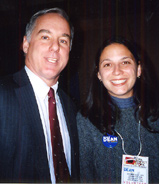|
|
| This is the first in a series of profiles of activists working toward victory in Maryland and beyond in the Democratic presidential primaries. On the Republican side, there is no contest, for President George W. Bush is unchallenged. |
Dock of the Bay
Sign on, Meet up, Change the Nation
Iowa’s Early Frost Chills Dean’s Grassroots Supporters
This is Howard Dean’s Annapolis grassroots.
Seventeen-year-old highschooler Ian Hines of Millersville, organizing Generation Dean nationwide from his computer. Twenty-eight-year-old dentist Meredith Esposito, of Annapolis, driving to Iowa to sleep in a winterized campground and witness for Dean among the nation’s first voters. Fifty-four-year-old nurse Nancy Sullivan, also of Annapolis, drawing like-minded voters like bears to honey at a monthly meetup. Seventy-three-year-old retiree Selma Goldberg, a self-styled “passionate Zionist” who braves cold nights out for the sake of Howard Dean. Retired U.S. Navy Captain Grayson Merrill, who, at 92, might be Dean’s oldest supporter in Annapolis.
On the first Wednesday night of the month for the past nine months and until the Democrats nominate their candidate this summer — first at Donna’s Cafe in Borders Books at the Annapolis Mall, now at the Crabcake Factory — you can see the Annapolis grass growing. Eighty supporters turned out for the January 2004 meetup to find the confirmation of like minds, to make bonds and to plan how to elect their candidate. That’s about average, says Sullivan, maybe a little lower than the 100 she was expecting as Goldberg, for one, met up closer to home in Bowie that night.
“I’ve worked in every campaign since George McGovern’s — but not at grassroots,” said Sullivan. “That’s what’s hard, building the grassroots. This started at grassroots, so we have our infrastructure already built.”
Meetup supporters are the ground soldiers of the campaign, signing on, reaching out, phone banking and canvassing. The Annapolis grassroots were ready to go forth and change the world at this January meeting.
Hines gladly soldiers for a campaign that welcomes his young efforts. “The conversation about the future of America has been held above the heads of people my age for too long,” he said. “Dr. Dean has taken the time to ask what we think and ask for our vote in a serious way, and to include people my age in serious positions in his campaign.”
Hines enlisted as a full-time volunteer blog manager for Generation Dean, which reaches out to young supporters of the campaign.
 |
photo courtesy of Meredith Esposito
Meredith Esposito traveled to Cedar Plains, Iowa, to build support for would-be Democratic presidential nominee Howard Dean. |
Undaunted by seven decades, Goldberg has been another of those soldiers. In Dean she said she saw a candidate who can “turn back the conservative tide in the Democratic party. After his early and vocal opposition to the Iraq war and to Bush as a leader, both when he was essentially a lone voice, I was sure,” she said, “I wanted him in the White House.
Enlisting for her has meant she has “written a few letters to Iowans and citizens in New Mexico, attended meetups, donated money and mostly talked the good doctor up to family and friends,” Goldberg said. “Not a lot for sure, but it is what I can do, given some limitations.”
Esposito, four decades younger but also born again to the Democratic Party through Dean’s candidacy, has gone further. She identifies with Dean’s fiscal conservatism and his laissez faire stand on social issues. She believes he can undo President George Bush’s “squandering of the international community’s friendship of 9/11.”
The young dentist went all the way to Cedar Rapids, Iowa, with her husband and meetup stalwarts Lianna Dozor and Gordon Bennett, driving 15 hours to join volunteers from across the nation.
“We knocked on over 500 doors, got to hear four candidates and to talk to Dean,” said Esposito. “Gordon put his arm around Howard and said, ‘we’ll get you in there, but if you ever lie to us we’ll turn on you like a pack of angry wolves.’ And Howard promised he wouldn’t.”
Then, January 19, Iowa held its caucuses. Those 1,993 precinct caucuses frosted Dean’s hopes, reminding campaigners and supporters that winter tests early-sprouting roots, even grassroots.
Now, Esposito feels the chill. “I’ll be lying if I said I wasn’t disappointed,” she said. “But I don’t think this means the end of his campaign. Reagan, Bush senior and Clinton lost Iowa and went on to win the presidency.”
She’s still heading off for New Hampshire as a Dean ground soldier this weekend, in preparation for that state’s January 27 presidential primary. But her certainty has been shaken.
“Iowa pointed out some weakness in his candidacy,” Esposito said, “and I hope he takes a message from it. With so much negativity, not just on his part, he hasn’t gotten his message out about what he wants to do for the country. People think he’s just an angry guy against the war.”
Style as well as message troubled this ground soldier for a notoriously grumpy general. “He didn’t handle attacks as graciously as he should have,” she worried. “And he needs to, because George Bush will really be flinging things at him.”
Goldberg, who had abandoned the Democratic Party for the Green Party before being lured back by Dean, blamed the party for his upset. “If you don’t play along,” she cautioned, “they will drum you out, even though they have nothing to offer. Remember, the others supported Bush’s initiatives: the Iraq war, tax cuts, budget.”
Dean, Goldberg said, “is still my man.” And she stands by her man. “I await word,” she said, “on what he wants done.”
A month from now, Maryland’s Dean soldiers will be campaigning on their own turf. Dean Maryland coordinator Walter Ludwig thinks Maryland’s March 2 primary could be a big one. “If it’s still close” — meaning that no clear leader emerges from New Hampshire — “Maryland could look winnable to all the candidates,” he said.
His thinking is probably wishful. California and New York’s bigger-stakes primaries are the same day. But Maryland will be one more trial by fire for Dean’s grassroots army, which now knows that campaigns aren’t won by optimism alone once the battle is joined.
— SOM
to the top
Working Behind Scenes for Martin Luther King
Somebody’s got to feed the celebrating masses
Seven hundred people celebrated Martin Luther King’s birthday over breakfast this past Monday. It was up to Wanda Grace and her staff from the school’s food service to make sure no one left hungry.
The crowd laughed, talked, shook hands with strangers and hugged friends. Over the loudspeaker the occasional announcement interrupted the music.
But mostly people lined up around the four food stations set up around the gym and piled plates with breakfast of eggs, bacon, sausage, potatoes, pastries and bagels. A few lean souls had to satisfy themselves with fruits.
“I have no idea how many people I’ve served so far,” said a smiling Evelyn Matthews, one of the servers.
Around the gym, exhausted food workers who had begun the day at the crack of dawn cleared dirty dishes and carried food out to the stations while the line of eaters seemed to grow instead of shorten. Some people smiled appreciatively while others seemed upset that they had to stand in line like anyone else.
 |
photo by Louis Llovio
Evelyn Matthews, right, served guests at the Martin Luther King Jr. Breakfast at Anne Arundel Community College. |
On the dais, speakers took to the podium accompanied by the muted sounds of silverware scraping against plates. Sen. Paul Sarbanes, House Speaker Michael Busch and Annapolis Mayor Ellen Moyer talked of Dr. King’s impact not only on their lives but also on communities around the country.
Anne Arundel County Executive Janet Owens sent a videotaped message in her stead.
Back at the buffet, many waited patiently for their second or even third servings.
Awards honored local school children for writing essays on Dr. King’s life and community activists for their work; all the while stragglers made their way to the stations for a last snack before keynote speaker, legendary civil rights attorney Morris Dees, took to the podium.
“The logistics is what makes this tough,” said Grace as the crowd at the stations waned and she was able to slow down. “Getting all this food in and out is hard work.”
While satisfied diners sat back, digesting breakfast and listening to the steady stream of speakers, the food staff filled paper plates and went to the back to eat and listen to Dees.
“We can send a man to Mars, but we can’t bring down the price of medicines,” he nearly shouted, his thick Alabama drawl laced with indignation. The crowd applauded, but the workers in the back just nodded, knowingly.
The Stansbury Singers belted out Bob Marley’s classic “Redemption Song” gospel style to close the breakfast as the crowd rushed to their coats and to the rest of the holiday.
For Grace’s people, though, the work day was only halfway through.
— Louis Llovio
to the top
Watt’s up?
Energy saving as lawmakers raise ante in high-stakes political poker
What’s the best method of easing the energy crunch? Promote national programs or set state standards?
In Maryland, the answer is: It depends.
Last week, the Democratic-majority General Assembly voted to override Republican Gov. Robert Ehrlich’s veto of a bill that required energy efficiency standards on appliances ranging from traffic lights to air conditioners to ceiling fans. Meanwhile, the state’s chief executive was appearing in newspaper and radio ads promoting the federal government’s EnergyStar program.
Ehrlich has repeatedly said he supports greater energy efficiency for savings and for environmental protection, but he also believes the federal government should take the lead rather than have the states do so piecemeal.
 |
| Despite last year’s veto of a state energy-efficiency bill, Gov. Ehrlich promotes the federal Energy Star program. |
Legislative leaders apparently feel differently, and as a result, Maryland has been thrust to the forefront of a national movement.
In the past two years, California, New York and Florida have passed energy-efficiency measures similar to the one that Maryland passed and that the governor vetoed last year. Lawmakers in Connecticut, Illinois, Maine, Massachusetts, New Hampshire, New Jersey, Pennsylvania and Rhode Island are all set to take similar action this year, according to the National Conference of State Legislatures.
Now that the Maryland law is back on track, what will it accomplish? Advocates say it will help reduce peak summer electric use by more than 200 megawatts in 2010 — enough to power 75,000 homes — and by more than 400 megawatts in 2020. That translates to $30 million in savings by 2010 and $600 million by 2020. It could also help keep natural gas bills down, which could help consumers come July when electricity rate caps expire.
But it’s more than money the resurrected law is expected to save. Supporters say the law will also reduce nitrogen oxide pollution by more than two million pounds per year while making significant cuts in smog and global warming pollution.
Local green groups, Baltimore Gas and Electric and retailers such as Home Depot all supported the Maryland law during last year’s session. Craig Menear, a Home Depot senior vice president, even wrote a letter to the state Senate supporting the override.
Still, partisan bickering hung over the state capitol like a smog cloud last week. Senate Minority Leader Lowell Stoltzfus called the override vote “a real slap in the face and a deliberate attempt to embarrass the governor.” Senate President Thomas V. Mike Miller rejected that claim, but not before questioning why all 14 Republican senators voted to sustain the veto when the bill passed with some bipartisan support last year.
However the override vote is scored in the annals of political history, many agree that this time, you can chalk one up for both consumers and the environment, whether they’re inside state borders or not.
“It’s a win-win for Maryland,” declared Mike Tidwell, executive director of the Chesapeake Climate Action Network. “Any bill that passes in Annapolis that saves Maryland citizens hundreds of millions of dollars and reduces electricity consumption and is good for the environment is good for the nation.”
— Gary Starikoff
to the top
Earth Journal
A Winter Sunday Morning
Belying the brilliant sunshine, the Bay was locked in a biting chill, weather more suited to Eskimos than Marylanders. Still, my dachshund Rose lapped it up on our morning walk, bounding over crispy grass and stiff-as-meringue beach sand.
That’s when I noticed the swans, some 20 feet apart, each in its own small swimming pool just off shore, the Bay frozen around them in a sheer sheet of ice. Never the twain shall meet, I thought sadly. Mute swans both, one a patient sentinel, the other angling and anxious to get free with futile hops at stepping up on ice that surely wouldn’t hold. Overhead, tundra swans flew by, and a larger flock swam farther out in the open water, proving perhaps that experience counts when it comes to some things, like getting used to winter.
 Rounding back on our walk, I found the patient swan still corralled in its frozen state of affairs, and the fidgety swan long gone, though where I couldn’t tell: No watery trail was left, no tell-tale signs on the thin ice that by now crackled like a blazing fire, beginning to thaw in the warm sun. Rounding back on our walk, I found the patient swan still corralled in its frozen state of affairs, and the fidgety swan long gone, though where I couldn’t tell: No watery trail was left, no tell-tale signs on the thin ice that by now crackled like a blazing fire, beginning to thaw in the warm sun.
The small morning drama had few witnesses except gulls that could stand on the ice, a species of swan that knew the difference and a woman with a small dog taking a walk in the winter cold. Only I remarked the elementary Sunday School lesson of patience and perseverance and wisdom, the inevitable, possibly the preventable and the absolutes of a winter.
“Winter is on my head,” wrote novelist Victor Hugo, “but eternal spring is in my heart.” Here in Bay Country, winter is on our heads too, and closing in around us, like the swans. It’s a time to look at the lessons the season has to offer just outside our windows, and keep spring in our hearts like the Eskimos must as winter settles in.
— M.L. Faunce
to the top
Way Downstream …
In Virginia, preservationists are fighting to save the 4,000-acre Crow’s Nest peninsula along Chesapeake Bay, which features some of the oldest trees in the Mid-Atlantic region, among them a 600-year-old pin oak that was around when Capt. John Smith explored the Chesapeake, the Fredricksburg Freelance Star reports. Developers recently rejected a $30 million bid by conservationists to save the pristine land…
At Yale University, scientists last week identified the receptor on mosquitoes that enables the blood-sucking devils to home in on human sweat and other smells. The discovery will promote research to create chemicals that block these receptors — and make better repellents…
In Maine, actor Paul Newman donated $10,000 last week to help build an 18-mile bike trail near Waterville. Newman got to know the area last summer while filming Empire Falls, a Pulitzer Prize winning novel by Maine author Richard Russo…
In Hong Kong, the SARS outbreak is killing the business of restaurants that serve snake. Severe Acute Respiratory Syndrome hasn’t been traced to reptiles, but diners have nonetheless shunned restaurants where snakes are killed and skinned at their tables, Reuters reports…
 Our Creature Feature comes from Washington, where two consumer groups last week sued the federal government to stop the sale of GloFish, the genetically engineered fish that glow in the dark. To many people, the fish, engineered in Singapore, look cool shining in fish tanks under a black light. Our Creature Feature comes from Washington, where two consumer groups last week sued the federal government to stop the sale of GloFish, the genetically engineered fish that glow in the dark. To many people, the fish, engineered in Singapore, look cool shining in fish tanks under a black light.
But the advocacy groups, the Center for Food Safety and the International Center for Technology Assessments, see something fishy in the decision by the FDA not to regulate genetically modified fish no matter whether they’re for food or fun. What’s more, they worry that the fish could pollute the gene pool of wild fish if they get flushed down the toilet or otherwise escape and then mate.
to the top
|
|